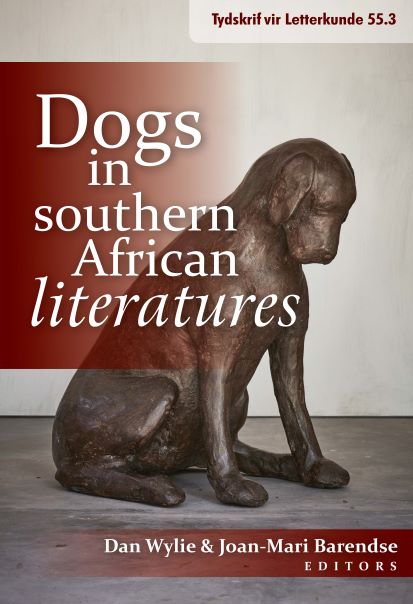On queerly reading canid tropes in Eben Venter’s Wolf, Wolf
DOI:
https://doi.org/10.17159/2309-9070/tvl.v.55i3.5510Keywords:
canid tropes, citizenship, Eben Venter, queer relationalityAbstract
The intertwined effect of loss of power on facets of masculinist identity (being a son, a lover, a citizen) and on categories of belonging (filial, intimate, national) is explored in Eben Venter’s Wolf, Wolf (2013). As the protagonist tries to navigate the lived actuality of contemporary South African life, the experience of multiple loss(es) leads him to consider the possibility of alternative ways of navigating the ‘in-between’ spaces of family structures, intimate connection, and national belonging. Curiously, the presence of canid tropes and canid symbolism appear alongside considerations of belonging. This article explores a reading of the canid presence and how it can productively be read as external manifestations of affective states, notably desire, shame and exclusion. Venter’s intentional blurring of boundaries (especially within homoerotic and homosocial bonds) between dog/wolf/jackal and man, citizen and immigrant, messy, carnal corporality and immaterial sterile cyberspace, queers the relationships presented in the narrative. The canid presence (an erotised wolfhound mask, farm dogs as machinic extensions of white masculinity, sustained ontological slippage between dogs and immigrants) acts as textual indicator that the protagonist finds himself situated outside heteronormative, filial and national categories.
Downloads
References
Beckman, F. Between pleasure and desire: A Deleuzean theory of sexuality. Edinburgh University, 2014.
Deleuze, G. “The body, the meat, and the spirit.” (In: Francis Bacon: The Logic of Sensation.) Bloomsbury
Academic, 1981.
Gervasio, N. 2015. “Jack Halberstam’s Queer Futures: Zombie Humanism at the end of the world.” [Blog]
Available at: <http://irwgs.columbia.edu/blog/jack-halberstams-queer-futures-zombie-humanism=endworld>.
Accessed: 1 December 2016.
Kohn, E. 2007. How dogs dream: Amazonian natures and the politics of transspecies engagement. American
Ethnologist, 34(1), 3–24.
MacInnes, J. The end of masculinity. Open University Press, 1998.
Olson, G. 2015. Criminals as animals from Shakespeare to Lombroso. Culture Machine Reviews, 2015.
Sedgwick, E.1985. Between men: English literature and male homosocial desire. Columbia UP.
Venter, E. Wolf, Wolf. Tafelberg Publishers, 2013.
Downloads
Published
Issue
Section
License
Copyright (c) 2018 Tydskrif vir Letterkunde

This work is licensed under a Creative Commons Attribution-ShareAlike 4.0 International License.


 https://orcid.org/0000-0001-6465-6584
https://orcid.org/0000-0001-6465-6584


.png)